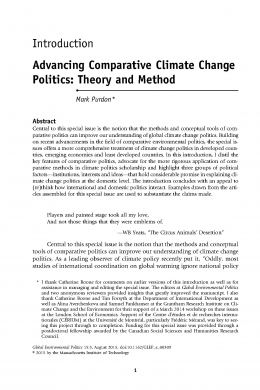Advancing Comparative Climate Change Politics: Theory and Method
Central to this special issue is the notion that the methods and conceptual tools of comparative politics can improve our understanding of global climate change politics. Building on recent advancements in the field of comparative environmental politics, the special issues offers a more comprehensive treatment of climate change politics in developed countries, emerging economies and least developed countries. In this introduction, I distil the key features of comparative politics, advocate for the more rigorous application of comparative methods in climate politics scholarship and highlight three groups of political factors—institutions, interests and ideas—that hold considerable promise in explaining climate change politics at the domestic level. The introduction concludes with an appeal to (re)think how international and domestic politics interact. Examples drawn from the articles assembled for this special issue are used to substantiate the claims made.
Central to this special issue is the notion that the methods and conceptual tools of comparative politics can improve our understanding of climate change politics. As a leading observer of climate policy recently put it, “Oddly, most studies of international coordination on global warming ignore national policy and treat governments as ‘black boxes.’ Few analysts of international policy peer inside the box to discover how it works.”
Comparative politics helps us open these “black boxes.” Indeed, Harrison and Sundstrom made a similar argument in an earlier special issue of this journal, and comparative approaches increasingly find expression in Global Environmental Politics. This special issue extends comparative research to includes investigation into climate change politics of developed countries, emerging economies and, particularly novel, least developed countries (LDCs)—which have received insufficient attention to date. This introduction provides some cohesion to a series of studies covering very different parts of the world and a range of issues. Comparative climate change politics should be seen as a subset of comparative environmental politics. In a recent effort to consolidate the state of knowledge in this emerging field, Steinberg and VanDeveer argued that comparative environmental politics needs to better integrate comparative politics and environmental policy—two fields that have suffered from mutual disengagement— towards a doubly engaged research program. Comparative politics themes that continue to have underexplored links to climate change and broader environmental issues include the literature on the role of the state and social conflict in processes of economic modernization, the role of institutions in economic development, and variation in the relationship between the state, markets, and society. Three groups of political factors in the comparative politics literature— institutions, interests, and ideas—hold considerable promise in explaining domestic climate change politics. However, comparativists also need to become more deeply engaged with environmental policy literatures. Because of the urgency of climate change, most climate issues are investigated not simply to understand what is occurring but to identify opportunities for intervention and remediation While bringing together comparative politics and public policy is important, comparative climate change politics needs to go further—toward a triply engaged social science.
The overarching theme of this special issue is a need to integrate research traditions of comparative politics, public policy, and international relations. Because climate change is politically salient, if not security relevant, in ways other global environmental problems are not,8 research must retain an international dimension. Such a claim will not be lost on the Global Environmental Politics readership. In this introduction I hope to create a place for domestic politics in IR research related to climate change
The key message emerging from this special issue is the need for research into climate change politics to extend beyond institutions and better address interests and ideas at the international, state and subnational levels. While all three factors are important for domestic climate change politics, many institutions are much easier to observe than interests and ideas; consequently, institutional analysis tends to be over-represented in domestic climate change literature.11 Broadening political analysis to consider interests and ideas along with institutions improves the explanatory power of climate change politics. This also resonates with thinking about climate change politics internationally. It is increasingly clear that we need to move away from the continued fixation with the international climate change regime—“the players and painted stage”—and develop alternative IR theoretical approaches that leave more space for domestic politics. Neoliberal institutionalism may have been an appropriate strategy for understanding international climate change negotiations, but the climate change regime complex is now mature and complex enough that we should ask for more from IR theory.

